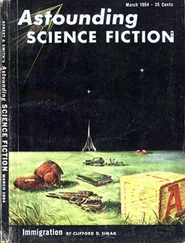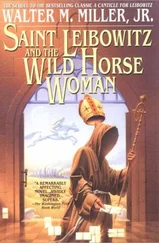A verse from the Dies lrae drifted into mind, and it nagged at him:
Quid sum miser tunc dicturus?
Quem patronum rogaturus,
Cum vix justus sit securus?
“What am I, who am wretched, then to say? Whom shall I ask to be my protector, since even the just man is scarcely safe?” Vix securus? Why “scarcely safe”? Surely He would not damn the just? Then why are you shaking so?
Really, Doctor Cors, the evil to which even you should have referred was not suffering, but the unreasoning fear of suffering. Metus doloris. Take it together with its positive equivalent, the craving for worldly security, for Eden, and you might have your “root of evil,” Doctor Cors. To minimize suffering and to maximize security were natural and proper ends of society and Caesar. But then they became the only ends, somehow, and the only basis of law — a perversion. Inevitably, then, in seeking only them, we found only their opposites: maximum suffering and minimum security.
The trouble with the world is me. Try that on yourself, my dear Cors. Thee me Adam Man we. No “worldly evil” except that which is introduced into the world by Man — me thee Adam us — with a little help from the father of lies. Blame anything, blame God even, but oh don’t blame me. Doctor Cors? The only evil in the world now, Doctor, is the fact that the world no longer is. What pain hath wrought?
He laughed weakly again, and it brought the ink.
“Me us Adam, but Christ, Man me; Me us Adam, but Christ, Man me,” he said aloud. “You know what, Pat? — they’d… together… rather get nailed on it, but not alone… when they bleed… want company. Because… because why it is. Because why it is the same as Satan wants Man full of Hell. I mean the same as Satan wants Hell full of Man. Because Adam… And yet Christ… But still me…Listen, Pat—”
This time it took longer to drive the inky Dark away, but he had to make it dear to Pat before he went into it all the way. “Listen, Pat, because… why it is I told her the baby had to… is why I. I mean. I mean Jesus never asked a man to do a damn thing that Jesus didn’t do. Same as why I. Why I can’t let go. Pat?”
He blinked several times. Pat vanished. The world congealed again and the blackness was gone. Somehow he had discovered what he was afraid of. There was something he had yet to fulfill before that Dark closed over him forever. Dear God, let me live long enough to fulfill it. He was afraid to die before he had accepted as much suffering as that which came to the child who could not comprehend it, the child he had tried to save for further suffering — no, not [or it, but in spite of it. He had commanded the mother in the name of Christ. He had not been wrong. But now he was afraid to slide away into that blackness before he had endured as much as God might help him endure.
Quem patronum rogaturus,
Cum vix justus sit securus?
Let it be for the child and her mother, then. What I impose, I must accept. Fas est .
The decision seemed to diminish the pain. He lay quietly for a time, then cautiously looked back at the rock heap again. More than five tons back there. Eighteen centuries back there. The blast had broken open the crypts, for he noticed a few bones caught between the rocks. He groped with his free hand, encountered something smooth, and finally worked it free. He dropped it in the sand beside the ciborium. The jawbone was missing, but the cranium was intact except for a hole in the forehead from which a sliver of dry and half-rotten wood protruded. It looked like the remains of an arrow. The skull seemed very old.
“Brother,” he whispered, for none but a monk of the Order would have been buried in those crypts.
What did you do for them, Bone? Teach them to read and write? Help them rebuild, give them Christ, help restore a culture? Did you remember to warn them that it could never be Eden? Of course you did. Bless you, Bone, he thought, and traced a cross on its forehead with his thumb. For all your pains, they paid you with an arrow between the eyes. Because there’s more than five tons and eighteen centuries of rock back there. I suppose there’s about two million years of it back there — since the first of Homo inspiratus.
He heard the voice again — the soft echo-voice that had answered him a little while ago. This time it came in a kind of childish singsong: “la la la, la-la-la—”
Although it seemed to be the same voice he had heard in the confessional, surely it could not be Mrs. Grales. Mrs. Grales would have forgiven God and run for home, if she had got out of the chapel in time — and please forgive the reversal, Lord. But he was not even sure that it was a reversal. Listen, Old Bone, should I have told that to Cors?
Listen, my dear Cors, why don’t you forgive God for allowing pain? If He didn’t allow it, human courage, bravery, nobility, and self-sacrifice would all be meaningless things. Besides, you’d be out of a job, Cors.
Maybe that’s what we forgot to mention, Bone. Bombs and tantrums, when the world grew bitter because the world fell somehow short of half-remembered Eden. The bitterness was essentially against God. Listen, Man, you have to give up the bitterness—”be granting shriv’ness to God,” as she’d say — before anything; before love.
But bombs and tantrums. They didn’t forgive.
He slept awhile. It was natural sleep and not that ugly mind-seizing nothingness of the Dark. A rain came, clearing the dust. When he awoke, he was not alone. He lifted his cheek out of the mud and looked at them crossly. Three of them sat on the rubble heap and eyed him with funereal solemnity. He moved, They spread black wings and hissed nervously. He flipped a bit of stone at them. Two of them took wing and climbed to circle, but the third sat there doing a little shuffle-dance and peering at him gravely. A dark and ugly bird, but not like that Other Dark. This one coveted only the body.
“Dinner’s not quite ready, brother bird,” he told it irritably. “You’ll have to wait.”
It would not have many meals to look forward to, he noticed, before the bird itself became a meal for another. Its feathers were singed from the flash, and it kept one eye closed. The bird was soggy with rain, and the abbot guessed that the rain itself was full of death.
“la la la, la-la-la wait wait wait till it dies la…”
The voice came again. Zerchi had feared that it might have been a hallucination. But the bird was hearing it too. It kept peering at something out of Zerchi’s range of vision. At last it hissed raucously and took wing.
“Help!” he shouted weakly.
“help,” parroted the strange voice.
And the two-headed woman wandered into sight around a heap of rubble. She stopped and looked down at Zerchi.
“Thank God! Mrs. Grales! See if you can find Father Lehy—”
“thank god mrs. grales see if you can…”
He blinked away a film of blood, and studied her closely.
“Rachel,” he breathed.
“rachel,” the creature answered.
She knelt there in front of him and settled back on her heels. She watched him with cool green eyes and smiled innocently. The eyes were alert with wonder, curiosity, and — perhaps something else — but she could apparently not see that he was in pain. There was something about her eyes that caused him to notice nothing else for several seconds. But then he noticed that the head of Mrs. Grales slept soundly on the other shoulder while Rachel smiled. It seemed a young shy smile that hoped for friendship. He tried again.
“Listen, is anyone else alive? Get—”
Melodious and solemn came her answer: “listen is anyone else alive—” She savored the words. She enunciated them distinctly. She smiled over them Her lips reframed them when her voice was done with them. It was more than reflexive imitation, he decided. She was trying to communicate something. By the repetition, she was trying to convey the idea: I am somehow like you.
Читать дальше








